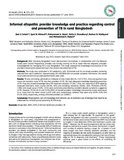| dc.contributor.author | Islam, Qazi S. | |
| dc.contributor.author | Ahmed, Syed M. | |
| dc.contributor.author | Islam, Mohammad A. | |
| dc.contributor.author | Chowdhury, Anita S. | |
| dc.contributor.author | Siddiquea, Bodrun N. | |
| dc.contributor.author | Husain, Mohammad A. | |
| dc.date.accessioned | 2016-04-27T10:01:44Z | |
| dc.date.available | 2016-04-27T10:01:44Z | |
| dc.date.copyright | 2014 | |
| dc.date.issued | 2014-06-17 | |
| dc.identifier.citation | Islam, Q. S., Ahmed, S. M., Islam, M. A., Chowdhury, A. S., Siddiquea, B. N., & Husain, M. A. (2014). Informal allopathic provider knowledge and practice regarding control and prevention of TB in rural Bangladesh. International Health, 6(3), 225–231. http://doi.org/10.1093/inthealth/ihu025 | en_US |
| dc.identifier.issn | 1876-3405 | |
| dc.identifier.uri | http://hdl.handle.net/10361/5190 | |
| dc.description | Includes bibliographical references (page 231). | en_US |
| dc.description.abstract | Background: BRAC (formerly Bangladesh Rural Advancement Committee), in collaboration with the National
Tuberculosis Control Programme, provides one full-day training on TB to make informal allopathic providers
knowledgeable for managing TB in rural Bangladesh. This study explored the knowledge and practices of the
providers receiving the above training in the control and prevention of TB.
Methods: The study was conducted in 30 subdistricts, with 30 trained and 30 untrained providers randomly
selected from each subdistrict. Approximately 3% (49/1800) did not provide complete information. Pre-tested
structured and semi-structured questionnaires were used.
Results: TB was commonly perceived as a disease of only males (66.1%, 1157/1751). Only one-quarter knew
about the bacterial cause of TB. Very few providers (2.1%, 36) had adequate knowledge regarding prevention
of TB. They also lacked knowledge about TB treatment duration (71.6%, 1253), the meaning of DOTS (directly
observed treatment, short course) (26.0%, 455) and multidrug resistance (20.6%, 360). Antibiotics (79.7%,
1396) and cough syrup (75.0%, 1313) were commonly prescribed by providers despite symptoms suggestive
of TB. However, 70.2% (613) and 74.5% (650) of trained providers’ knowledge and practice scores were equal
to or more than the mean scores (≥6.97 and ≥6.6, respectively), whereas they were only 49.5% (435) and
64.2% (563), respectively, among untrained providers (p,0.0001).
Conclusions: Misperception, lack of knowledge and irrational use of antibiotics are challenges that need to be
addressed for controlling and preventing TB efficiently. | en_US |
| dc.description.statementofresponsibility | Qazi S. Islam | |
| dc.description.statementofresponsibility | Syed M. Ahmed | |
| dc.description.statementofresponsibility | Mohammad A. Islam | |
| dc.description.statementofresponsibility | Anita S. Chowdhury | |
| dc.description.statementofresponsibility | Bodrun N. Siddiquea | |
| dc.description.statementofresponsibility | Mohammad A. Husain | |
| dc.format.extent | 7 pages | |
| dc.language.iso | en | en_US |
| dc.publisher | International Health | en_US |
| dc.rights | BRAC University Journals are protected by copyright. They may be viewed from this source for any purpose, but reproduction or distribution in any format is prohibited without written permission. | |
| dc.subject | Bangladesh | en_US |
| dc.subject | BRAC | en_US |
| dc.subject | DOTS | en_US |
| dc.subject | Informal healthcare providers | en_US |
| dc.subject | TB | en_US |
| dc.title | Informal allopathic provider knowledge and practice regarding control and prevention of TB in rural Bangladesh | en_US |
| dc.type | Article | en_US |
| dc.contributor.department | James P Grant School of Public Health, BRAC University | |

